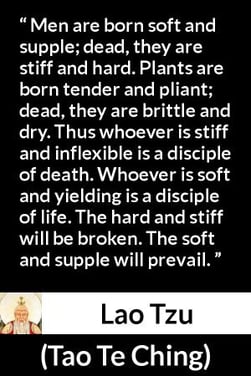 You’ve probably attempted to change and failed. It could be trying to lose weight, quit smoking, be on time, be better at time management or create systems and innovate your business.
You’ve probably attempted to change and failed. It could be trying to lose weight, quit smoking, be on time, be better at time management or create systems and innovate your business.
Changing habits is challenging for two reasons:
- We try to change the wrong thing.
- We try to change our habits in the wrong way.
Your first mistake is you try to change the wrong thing. Change occurs at three levels.
- The first layer is changing your outcomes. This level is concerned with changing your results: losing weight, publishing a book, winning a championship. Most of the goals you set are associated with this level of change.
- The second layer is changing your process. This level is concerned with changing your habits and systems: implementing a new routine at the gym, decluttering your desk for better workflow, developing a meditation practice. Most of the habits you build are associated with this level.
- The third and deepest layer is changing your identity. This level is concerned with changing your beliefs: your worldview, your self-image, your judgments about yourself and others. Most of the beliefs, assumptions, and biases you hold are associated with this level.
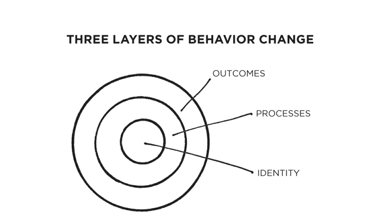 In Atomic Habits, James Clear shares an example:
In Atomic Habits, James Clear shares an example:
Two people are trying to quit smoking. You offer one a smoke.
“No thanks. I’m trying to quit.”
You approach the second, they decline as well.
“No thanks. I’m not a smoker.”
It’s a small difference, but this statement signals a shift in identity. Smoking was part of their former life, not their current one. They no longer identify as someone who smokes.
The first person still believes they are a smoker who is trying to be something else. They hope their behavior will change while carrying around the same beliefs.
Most people don’t consider identity change when they set out to improve. They just think, “I want to be skinny (outcome) and if I stick to this diet, then I’ll be skinny (process).”
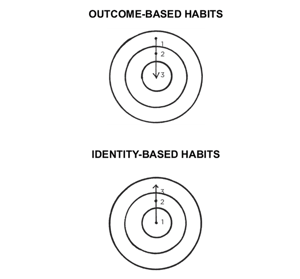 The ultimate form of intrinsic motivation is when a habit becomes part of your identity. It’s one thing to say I’m the type of person who wants this. It’s something very different to say I’m the type of person who is this.
The ultimate form of intrinsic motivation is when a habit becomes part of your identity. It’s one thing to say I’m the type of person who wants this. It’s something very different to say I’m the type of person who is this.
YOUR BELIEFS
Behind every system of actions is a system of beliefs.
Behavior that is incongruent with the self will not last.
True behavior change is identity change. You might start a habit because of motivation. The only reason you’ll stick with it is it becomes part of your identity.
Are these some of your beliefs? “I’m terrible with directions.” “I’m not a morning person.” “I’m bad at remembering people’s names.” “I’m always late.” “I’m not good with technology.” “I’m horrible at math.”
James Clear on building identity-based habits:
THE TWO-STEP PROCESS TO CHANGING YOUR IDENTITY
Every action you take is a vote for the type of person you wish to become.
I can remember my son, Dan, telling me, “Dad I’m not good at math!”
At the time Dan and I would be in my car for 2.5 hours to drive to my home, and then 2.5 hours back to his mother’s every other weekend.
.png?width=321&name=Identity%20Based%20Habits%20(Atomic%20Habits).png) I would remind him constantly, you are good at math, and to demonstrate this he and I would practice his multiplication tables nearly every trip back and forth.
I would remind him constantly, you are good at math, and to demonstrate this he and I would practice his multiplication tables nearly every trip back and forth.
Over time, guess what? Dan got good at math. So good, he became an engineer, earning his degree in Mechanical Engineering at UW-Wisconsin.
New identities require new evidence. If you keep casting the same votes you’ve always cast, you’re going to get the same results you’ve always had. If nothing changes, nothing is going to change.
Follow this simple two-step process:
Decide the type of person you want to be. Then (2) prove it to yourself with small wins.
First, decide who do you want to be?
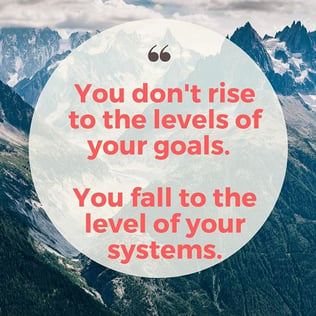 The first step is not what or how, but who. You need to know who you want to be. Otherwise, your quest for change is like a boat without a rudder.
The first step is not what or how, but who. You need to know who you want to be. Otherwise, your quest for change is like a boat without a rudder.
You have the power to change your beliefs about yourself. Your identity is not set in stone. You have a choice in every moment. You can choose the identity you want to reinforce today with the habits you choose today.
Ultimately, your habits matter because they help you become the type of person you wish to be. They are the channel through which you develop your deepest beliefs about yourself. Quite literally, you become your habits.
Remember, Forget About Setting Goals. Focus on This Instead - James Clear
To create an environment where everyone is inspired to give their best, contact Positioning Systems today to schedule a free exploratory meeting.
Growth demands Strategic Discipline.
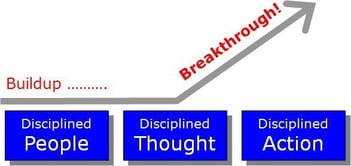 Building an enduring great organization requires disciplined people, disciplined thought, disciplined action, superior results, producing a distinctive impact in the world.
Building an enduring great organization requires disciplined people, disciplined thought, disciplined action, superior results, producing a distinctive impact in the world.
Discipline sustains momentum, over a long period of time, laying the foundations for lasting endurance.
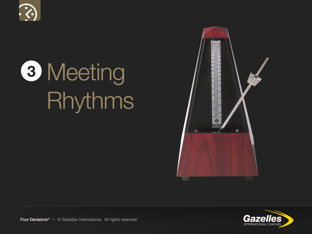 A winning habit starts with 3 Strategic Disciplines: Priority, Metrics, and Meeting Rhythms. Forecasting, accountability, individual, and team performance improve dramatically.
A winning habit starts with 3 Strategic Disciplines: Priority, Metrics, and Meeting Rhythms. Forecasting, accountability, individual, and team performance improve dramatically.
Meeting Rhythms achieve a disciplined focus on performance metrics to drive growth.
Let Positioning Systems help your business achieve these outcomes on the Four most Important Decisions your business faces:
|
DECISION |
RESULT/OUTCOME |
|
PEOPLE |
|
|
STRATEGY |
|
|
EXECUTION |
|
|
CASH |
|
Positioning Systems helps mid-sized ($5M - $250M+) business Scale-UP. We align your business to focus on Your One Thing! Contact dwick@positioningsystems.com to Scale Up your business! Take our Four Decisions Needs Assessment to discover how your business measures against other Scaled Up companies. We’ll contact you.
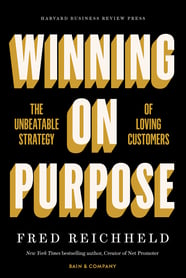 NEXT BLOG – Net Purpose Score – Winning on Purpose
NEXT BLOG – Net Purpose Score – Winning on Purpose
Fred Reichheld, the creator of Net Promoter Score, believes his customer loyalty measure should have been called Net Purpose Score. NPS helps your employees consistently enrich the lives they touch. That is the purpose of great organizations. Designed and deployed correctly, NPS can become an organization’s Net Purpose Score and gauge your progress toward living this purpose.






.jpeg?width=150&height=135&name=Hand%20with%20marker%20writing%20the%20question%20Whats%20Next_%20(1).jpeg)

